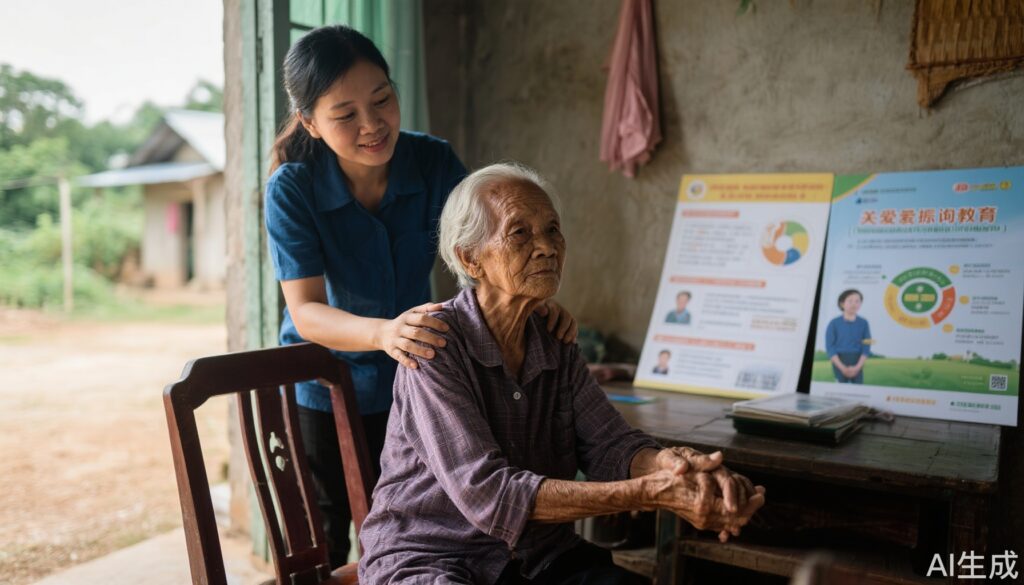Highlights
- REACH VN, a culturally tailored caregiver intervention, significantly reduced psychological distress and stress among dementia caregivers in Northern Vietnam at 3 months.
- Burden reduction (as measured by ZBI-12) became statistically significant at 6 months, but most other improvements diminished by this timepoint.
- The trial demonstrates the feasibility and short-term efficacy of caregiver support programs in low-resource, rapidly aging societies.
- Long-term sustainability and scalability require further research and adaptation.
Study Background and Disease Burden
Vietnam, like many low- and middle-income countries, is facing a demographic transition marked by a rapid rise in dementia prevalence. Family members, often with limited resources and formal support, shoulder the bulk of caregiving responsibilities. This situation leads to significant psychological distress, physical health problems, and social burden among caregivers. Despite this growing crisis, Vietnam has lacked rigorously evaluated, culturally relevant interventions to support dementia caregivers. Addressing this gap, the REACH VN study sought to adapt and test a proven Western caregiver intervention (Resources for Enhancing Alzheimer’s Caregiver Health – REACH) for the Vietnamese context, aiming to provide scalable, evidence-based support tailored to local cultural and healthcare realities.
Study Design
The REACH VN trial was a cluster randomized controlled trial conducted in Northern Vietnam. Forty communes (clusters) were randomized to either the intervention (REACH VN: 21 clusters) or an enhanced control (19 clusters). Participants were 350 family caregivers of people with dementia. The intervention group received 4–6 one-hour multicomponent sessions over 1–3 months, focusing on dementia education, stress management, skill-building, and culturally relevant support strategies, delivered by trained facilitators. The enhanced control group received a single session of dementia education.
Primary outcomes were:
– Caregiver psychological distress (Patient Health Questionnaire-4, PHQ-4)
– Caregiver burden (Zarit Burden Interview-12, ZBI-12)
Secondary outcomes included:
– Perceived stress (Perceived Stress Scale-10, PSS-10)
– Somatic symptoms (Patient Health Questionnaire-15, PHQ-15)
Mixed effects models assessed outcomes at 3 and 6 months, adjusting for baseline scores.
Key Findings
Of the 350 caregivers enrolled, 330 (94.3%) completed the 3-month assessment, demonstrating high retention and suggesting both feasibility and acceptability of the intervention.
At 3 months:
– The REACH VN group reported significantly lower psychological distress (PHQ-4, p < 0.001) compared to controls.
– No statistically significant difference in caregiver burden (ZBI-12, p = 0.05) was observed at this point.
– Perceived stress (PSS-10, p = 0.007) and somatic symptoms (PHQ-15, p < 0.001) were also improved in the intervention group.
At 6 months:
– The intervention group now showed significantly reduced caregiver burden (ZBI-12, p = 0.002), but this was not accompanied by persistent improvements in psychological distress (PHQ-4, p = 0.5), perceived stress, or somatic symptoms.
Effect sizes were moderate to small, typical for psychosocial interventions in caregiving populations. No serious adverse events associated with the intervention were reported. Notably, the time-limited nature of the effects, with most benefits dissipating by 6 months, highlights the potential need for booster sessions or ongoing support to sustain improvements.
Expert Commentary
This study is a landmark for dementia care in Vietnam, representing one of the first cluster RCTs to address the needs of family caregivers in a low-resource Asian setting. The cultural adaptation of the REACH program—long validated in Western countries—demonstrates both the universality of caregiver distress and the necessity of local tailoring for effectiveness. The initial improvements in psychological distress, stress, and somatic symptoms are encouraging, showing that even brief, structured support can make a measurable difference. However, the attenuation of benefits by 6 months mirrors challenges seen in other global settings and underscores the chronic, evolving strain of caregiving in dementia.
Limitations include the relatively short follow-up, lack of objective measures of care recipient outcomes, and possible contamination between clusters. The enhanced control group, while educational, may have received less attention than the intervention group, potentially inflating effect sizes through non-specific therapeutic effects. Generalizability to other regions of Vietnam or to caregivers of different cultural backgrounds requires further study.
Current international guidelines (such as those from the World Health Organization and Alzheimer’s Disease International) emphasize the need for scalable, culturally sensitive caregiver interventions as part of national dementia strategies. The REACH VN trial provides a model for how such recommendations can be pragmatically and effectively implemented in a Southeast Asian context.
Conclusion
The REACH VN cluster randomized controlled trial establishes that culturally adapted, multicomponent interventions can meaningfully reduce distress and stress in dementia family caregivers in Vietnam, at least in the short term. Sustainable impact may require ongoing support, integration with community resources, and policy-level commitment to caregiver health. Future research should explore maintenance strategies, digital delivery, and broader implementation to meet the rapidly growing burden of dementia care in Vietnam and similar settings.
References
Nguyen H, Nguyen HT, Nguyen NB, Tran D, Harvey DJ, Nguyen BT, Nguyen BTT, Nguyen AN, Nguyen CTH, Nguyen TTH, Nguyen TL, Nguyen ATP, Nguyen NH, Nguyen AL, Luong YH, Nguyen BH, Nguyen PQ, Gitlin LN, Nguyen TA, Pham T, Hinton L. Testing the Efficacy of a Culturally Adapted Family Dementia Caregiver Intervention (REACH VN): Results From a Cluster Randomized Controlled Trial in Northern Vietnam. Am J Geriatr Psychiatry. 2025 May;33(5):535-545. doi: 10.1016/j.jagp.2024.10.011. Epub 2024 Oct 23. PMID: 39547823; PMCID: PMC11903202.
World Health Organization. Global action plan on the public health response to dementia 2017–2025. Geneva: WHO; 2017.
Alzheimer’s Disease International. World Alzheimer Report 2022: Life after diagnosis: Navigating treatment, care and support. London: ADI; 2022.



